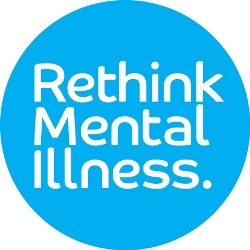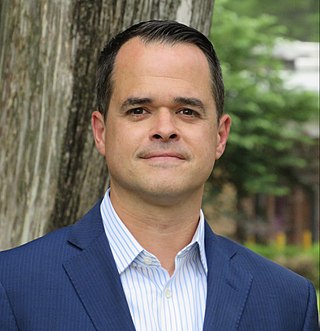
Joseph Peter Pantoliano is an American actor who has played over 150 roles across film, television, and theater. He is best known for portraying Ralph "Ralphie" Cifaretto on the HBO crime drama The Sopranos (1999–2007), for which he won a Primetime Emmy Award for Outstanding Supporting Actor in a Drama Series, and Cypher in the sci-fi action film The Matrix (1999).
The National Alliance on Mental Illness (NAMI) is a United States-based nonprofit organization originally founded as a grassroots group by family members of people diagnosed with mental illness. NAMI identifies its mission as "providing advocacy, education, support and public awareness so that all individuals and families affected by mental illness can build better lives" and its vision as "a world where all people affected by mental illness live healthy, fulfilling lives supported by a community that cares". NAMI offers classes and trainings for people living with mental illnesses, their families, community members, and professionals, including what is termed psychoeducation, or education about mental illness. NAMI holds regular events which combine fundraising for the organization and education, including Mental Illness Awareness Week and NAMIWalks.

Mental health encompasses emotional, psychological, and social well-being, influencing cognition, perception, and behavior. According to World Health Organization (WHO), it is a "state of well-being in which the individual realizes his or her abilities, can cope with the normal stresses of life, can work productively and fruitfully, and can contribute to his or her community". It likewise determines how an individual handles stress, interpersonal relationships, and decision-making. Mental health includes subjective well-being, perceived self-efficacy, autonomy, competence, intergenerational dependence, and self-actualization of one's intellectual and emotional potential, among others. From the perspectives of positive psychology or holism, mental health may include an individual's ability to enjoy life and to create a balance between life activities and efforts to achieve psychological resilience. Cultural differences, personal philosophy, subjective assessments, and competing professional theories all affect how one defines "mental health". Some early signs related to mental health difficulties are sleep irritation, lack of energy, lack of appetite, thinking of harming oneself or others, self-isolating, and frequently zoning out.

The Centre for Addiction and Mental Health is a psychiatric teaching hospital located in Toronto and ten community locations throughout the province of Ontario, Canada. It reports being the largest research facility in Canada for mental health and addictions. The hospital was formed in 1998 from the amalgamation of four separate institutions – the Queen Street Mental Health Centre, the Clarke Institute of Psychiatry, the Addiction Research Foundation, and the Donwood Institute. It is Canada's largest mental health teaching hospital, and the only stand-alone psychiatric emergency department in Ontario. CAMH has 90 distinct clinical services across inpatient, outpatient, day treatment, and partial hospitalization models. CAMH has been the site of major advancements in psychiatric research, including the discovery of the Dopamine receptor D2.
Social stigma is the disapproval of, or discrimination against, an individual or group based on perceived characteristics that serve to distinguish them from other members of a society. Social stigmas are commonly related to culture, gender, race, socioeconomic class, age, sexual orientation, sexuality, body image, physical disability, intelligence or lack thereof, and health. Some stigma may be obvious, while others are known as concealable stigmas that must be revealed through disclosure. Stigma can also be against oneself, stemming from negatively viewed personal attributes in a way that can result in a "spoiled identity".

Mind is a mental health charity in England and Wales. It was founded in 1946 as the National Association for Mental Health (NAMH).

Rethink Mental Illness Is a British charity that seeks to improve the lives of people severely affected by mental illness through their networks of local groups and services, information and campaigns. Its stated goal is to make sure everyone severely affected by mental illness has a good quality of life.
Patrick W. Corrigan is a US-based author and advocate for people with a mental illness, particularly in relation to the issue of stigma. He has written more than 15 books and 400 peer reviewed articles specializing in issues related to the mental illness stigmas. Corrigan suffered from mental illness himself and is most likely the reason his research has this focus. Corrigan currently resides in Northern Illinois, and family life is unknown.

Mental health first aid is an extension of the concept of traditional first aid to cover mental health conditions. Mental health first aid is the first and immediate assistance given to any person experiencing or developing a mental health condition, such as depression or anxiety disorders, or experiencing a mental health crisis situation such as suicidal ideation or panic attack.

Mental health literacy has been defined as "knowledge and beliefs about mental disorders which aid their recognition, management and prevention. Mental health literacy includes the ability to recognize specific disorders; knowing how to seek mental health information; knowledge of risk factors and causes, of self-treatments, and of professional help available; and attitudes that promote recognition and appropriate help-seeking". The concept of mental health literacy was derived from health literacy, which aims to increase patient knowledge about physical health, illnesses, and treatments.
Active Minds is a nonprofit organization dedicated to promoting mental health, especially among young adults, via peer-to-peer dialogue and interaction. Active Minds was founded by Alison Malmon in 2003, after her older brother died by suicide in 2000.
Stand to Reason is a UK-based mental health charity which aims to raise the profile of people who are mentally ill, fight prejudice, establish rights and achieve equality.

The Utah State Hospital (USH) is a mental hospital located in eastern Provo, Utah. The current superintendent is Dallas Earnshaw.
Stand Up For Mental Health (SMH), founded in 2004, is a program based in Vancouver, British Columbia, Canada, in which people who have mental illness are taught stand-up comedy as a form of therapy and then present to the community as a way of addressing the stigma, discrimination, and prejudice surrounding mental health problems. SMH does not consider itself a replacement for medication or conventional therapy, but instead a supplemental way for people with mental illness to heal while educating others. The classes are taught by counselor, stand-up comic and author of The Happy Neurotic: How Fear and Angst Can Lead to Happiness and Success, David Granirer who lives with depression. SMH has classes in Halifax, Montreal, Ottawa, Toronto, Guelph, Fort Frances, London (ON), Vancouver, Abbotsford/Chilliwack, Victoria and Courtenay. Famed Canadian comedian Mike MacDonald is a supporter of SMH and performs at many of their shows. Mike MacDonald has bipolar disorder.
Ross Eugene Szabo is the wellness director at Geffen Academy at UCLA. He is a mental health speaker and the CEO of Human Power Project.
In workplaces, especially in Australia, a mental health day is where an employee takes sick leave, or where a student does not attend school for a day or longer, for reasons other than physical illness. Mental health days are believed to reduce absenteeism and presenteeism, which is a reduction in productivity or other negative consequences resulting from a pressure to work. Mental health days differ from absenteeism in that the purpose is to reset one's mental health rather than due to a nonspecific desire or feeling to skip work.

David S. Carlucci is an American politician in Rockland County, New York. A member of the Democratic Party, he was the state senator for the 38th district, which includes most of Rockland County and parts of Westchester County until December 2020. Carlucci was one of the youngest senators elected to the New York State Senate in 2010 at just 29 years old.[3] Carlucci served as the chair of the Committee on Mental Health and Developmental Disabilities.

Time to Change was a mental health campaign in England, launched in 2007 with the objective of reducing mental health-related stigma and discrimination. Time to Change closed on 31 March 2021.
Mental illnesses, also known as psychiatric disorders, are often inaccurately portrayed in the media. Films, television programs, books, magazines, and news programs often stereotype the mentally ill as being violent, unpredictable, or dangerous, unlike the great majority of those who experience mental illness. As media is often the primary way people are exposed to mental illnesses, when portrayals are inaccurate, they further perpetuate stereotypes, stigma, and discriminatory behavior. When the public stigmatizes the mentally ill, people with mental illnesses become less likely to seek treatment or support for fear of being judged or rejected by the public. However, with proper support, not only are most of those with psychiatric disorders able to function adequately in society, but many are able to work successfully and make substantial contributions to society.

John Kevin Hines is an American suicide prevention speaker who attempted suicide by jumping from the Golden Gate Bridge in San Francisco, California in 2000 at the age of 19. His story gained major media coverage and he has since become a motivational speaker and advocate for suicide prevention.










